Keep reading to discover the fascinating holidays in the Bible, from ancient traditions to modern celebrations.
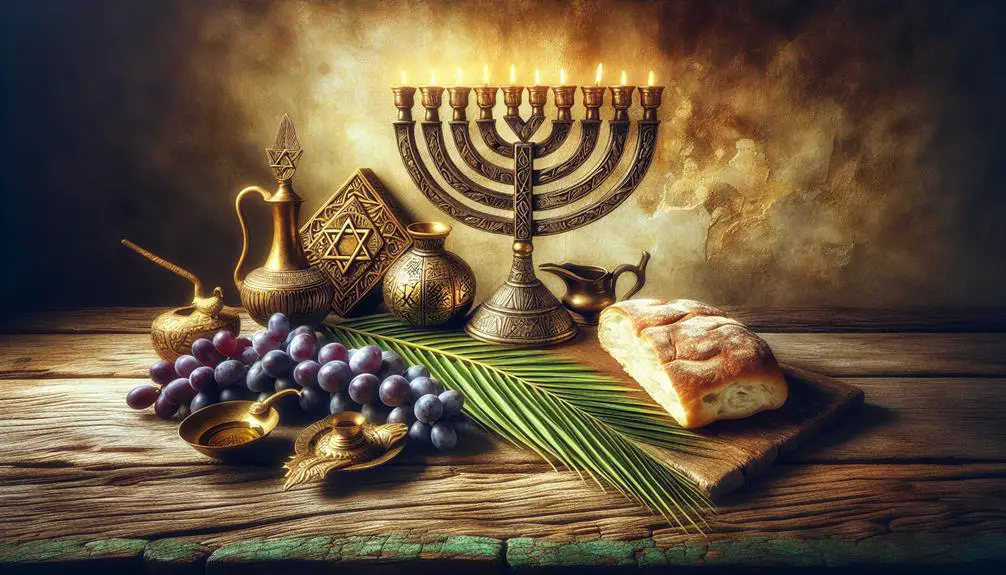
What Holidays Are in the Bible
You might think the Bible is just an ancient text, but it's actually brimming with more holiday spirit than the biggest clearance sale at your favorite store. From the well-known Passover, commemorating the Exodus, to the reflective Day of Atonement, these holidays aren't just dates on the calendar; they're rich with history, significance, and a depth of tradition that continues to influence celebrations today.
But why do these holidays matter, and how have they evolved from their biblical roots to modern observance? Stick around, and you'll uncover the layers of history and tradition that make these days so much more than mere mentions in an ancient book.
Key Takeaways
- Biblical holidays include Passover, Feast of Unleavened Bread, Feast of Weeks, Day of Atonement, and Feast of Tabernacles.
- These holidays commemorate significant historical and spiritual events, such as the Israelites' liberation and receiving the Torah.
- Observances involve rituals like fasting, prayer, and dwelling in sukkahs, fostering community and spiritual reflection.
- Themes of faith, gratitude, and unity are central, reflecting on divine provision and the enduring human spirit.
Passover: The Exodus Celebration
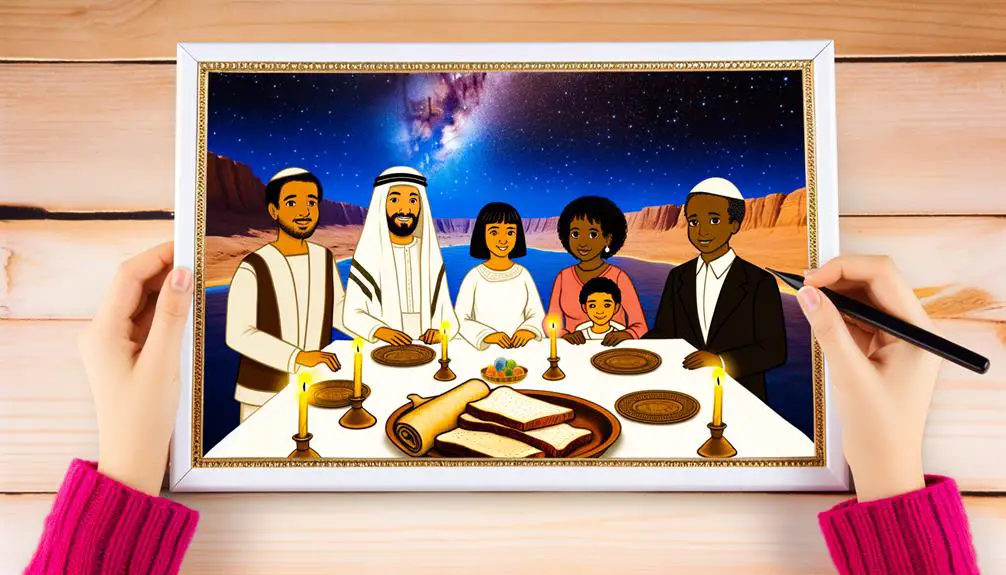
Passover, commemorating the Israelites' liberation from Egyptian bondage, marks a pivotal event in Jewish religious history. Its origins are deeply rooted in the narrative of the Exodus, where divine intervention led to the freedom of the Israelites from Pharaoh's oppression. This historic deliverance isn't just a tale of ancient times but serves as a foundational story that has shaped Jewish identity and religious practice.
In analyzing Passover's origins, you'll find that it's intricately linked with the concept of divine salvation and judgment. The Passover lamb, whose blood was used as a sign for the angel of death to 'pass over' the Israelites' homes, symbolizes both liberation and sacrifice. This act of faith and obedience underscores the profound relationship between the divine and the chosen people, establishing a covenant that extends beyond mere historical events to embody a lasting spiritual legacy.
Modern observances of Passover have evolved, yet they retain the core essence of remembering and re-living the Exodus experience. You partake in the Seder, a ritual feast that involves reading the Haggadah, eating symbolic foods, and engaging in prayers and songs. This contemporary practice isn't merely a ritualistic replication but an active remembrance that connects you with your ancestral past. Through these observances, you're invited to reflect on themes of freedom, redemption, and faith, making the ancient story of Exodus relevant in today's context.
In essence, Passover is a bridge that links the past with the present, inviting you to explore the depths of your faith while commemorating a seminal event in Jewish religious history. Through its origins and modern observances, Passover remains a vibrant and profound celebration of deliverance and hope.
Feast of Unleavened Bread: Purification and Remembrance
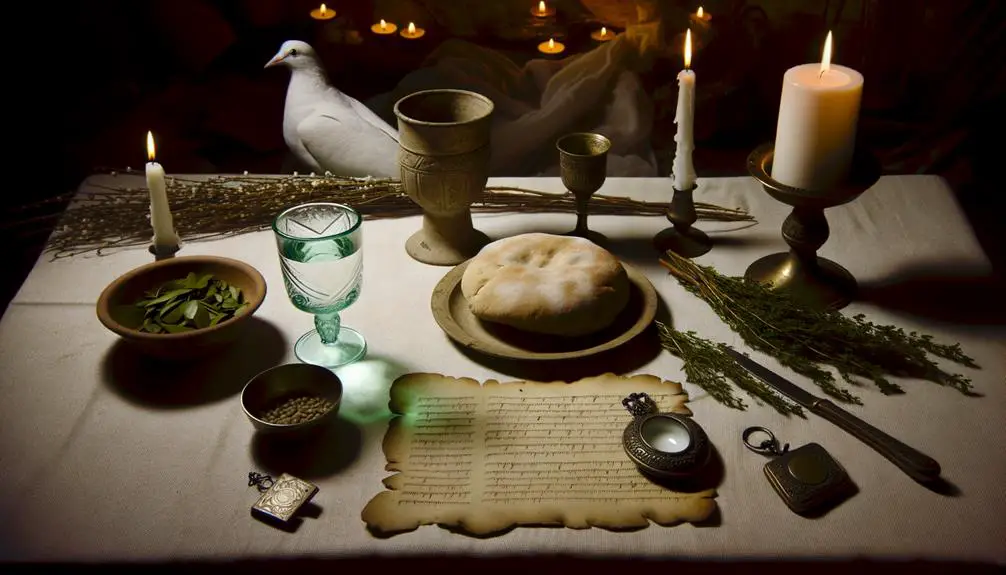
Observing the Feast of Unleavened Bread, you engage in a week-long period of purification and remembrance, meticulously avoiding leavened bread to commemorate the Israelites' hasty departure from Egypt. This observance embodies not just a historical recount but also a deep, spiritual cleansing, symbolically removing the 'leaven' of sin and malice from one's life. Throughout this period, participants reflect on themes of freedom, deliverance, and the profound transformation that accompanies a genuine return to one's spiritual roots.
Modern adaptations and cultural variations of this ancient feast have enriched its observance, making it both accessible and relevant to contemporary society. While the essence of the feast remains unchanged, these adaptations ensure its continuity across generations and geographies.
- Culinary Innovation: Modern kitchens experiment with unleavened bread recipes, infusing traditional dishes with new flavors while adhering to the feast's dietary restrictions. This culinary creativity not only honors the feast's origins but also showcases the adaptability of religious traditions to modern tastes and health consciousness.
- Educational Tools: Digital media and interactive workshops provide rich resources for teaching the historical and spiritual significance of the feast, engaging younger generations and those new to the tradition.
- Interfaith Dialogue: The Feast of Unleavened Bread serves as a platform for interfaith dialogue, highlighting shared values of liberation, renewal, and community across diverse religious backgrounds.
These modern adaptations and cultural variations ensure the Feast of Unleavened Bread remains a vibrant and meaningful observance, deeply rooted in history yet dynamically evolving to resonate with the modern faithful.
Feast of Weeks: Honoring the First Fruits
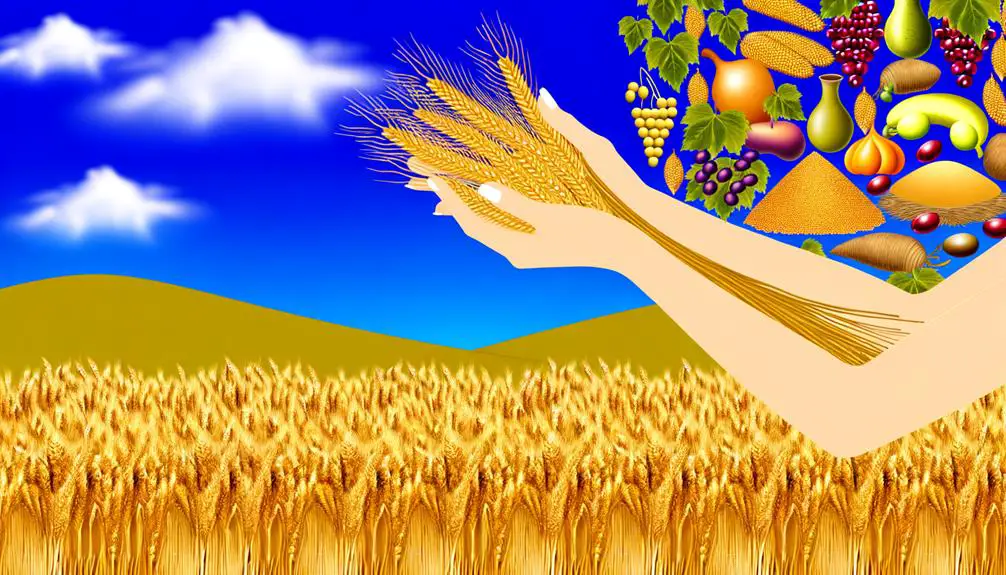
Celebrating the Feast of Weeks, you honor the first fruits of the harvest, a practice deeply embedded in ancient agricultural rituals and spiritual symbolism. This holiday, also known as Pentecost, holds dual significance: it marks the giving of the Torah on Mount Sinai and the peak of the wheat harvest in Israel. The agricultural importance of this feast cannot be overstated; it's a time when you give thanks for the bounty of the land, recognizing the divine provision in your sustenance.
The Feast of Weeks is observed exactly seven weeks after the second day of Passover, making it a bridge that connects the liberation from Egypt with the reception of the Torah, highlighting a journey from physical to spiritual freedom. The offering of the first fruits at the Temple, a central ritual of this feast, symbolizes the intertwining of religious devotion with the agricultural cycle.
Here's a closer look at its components:
Aspect |
Significance |
|---|---|
Timing |
50 days after Passover, aligning with the wheat harvest |
Offerings |
First fruits of the wheat harvest |
Spiritual Meaning |
Commemoration of receiving the Torah |
Agricultural Importance |
Celebration of the land's bounty |
Analyzing the Feast of Weeks reveals a deep connection between spiritual faith and the rhythms of the natural world. Pentecost significance extends beyond mere remembrance, acting as a yearly reaffirmation of faith, gratitude, and community bonds forged through shared rituals and the acknowledgment of human dependence on the divine for sustenance and spiritual nourishment.
Day of Atonement: Sacred Reconciliation
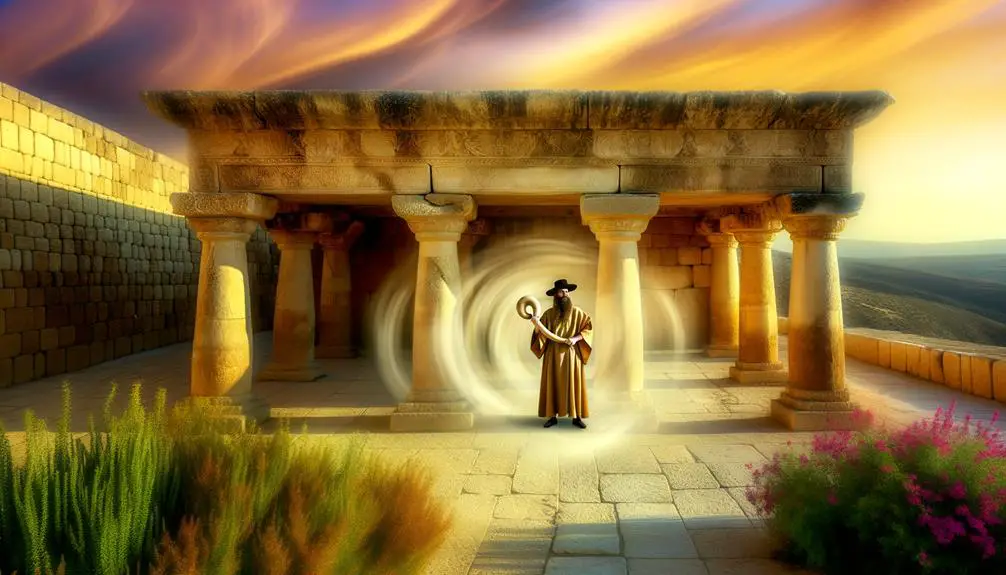
Amid the solemnity of the Jewish calendar, the Day of Atonement stands as a pivotal moment for introspection and reconciliation, inviting you to engage in a profound spiritual journey towards redemption. This day, known as Yom Kippur, isn't merely a ritual but a deeply ingrained cultural and religious observance that bridges the ancient and the modern, weaving a tapestry of tradition that remains relevant today.
Modern practices on this day include fasting, prayer, and the seeking of forgiveness, which serve as conduits to personal and communal purification. These practices aren't just acts of faith but are embedded with rich cultural significance, marking Yom Kippur as a cornerstone of Jewish identity.
- Fasting: An act of self-denial that symbolizes a break from the mundane, fostering spiritual clarity and discipline.
- Prayer: Through communal and individual prayers, you connect with the divine, reflecting on your actions and seeking guidance for the year ahead.
- Seeking Forgiveness: A crucial element that emphasizes reconciliation, not only with the divine but amongst individuals, reinforcing social bonds and communal harmony.
The Day of Atonement embodies the essence of sacred reconciliation, offering you a chance to reset morally and spiritually. Its significance transcends time, serving as a reminder of the enduring need for reflection, repentance, and renewal. The cultural significance of Yom Kippur underscores its role not only in religious observance but in shaping the moral and ethical fabric of the community. Through modern practices, the Day of Atonement continues to offer profound insights into the human condition, bridging the gap between the divine and the mundane.
Feast of Tabernacles: Joy and Gratitude

In the Jewish tradition, the Feast of Tabernacles, known as Sukkot, represents a time of unparalleled joy and profound gratitude, commemorating the Israelites' journey in the wilderness and God's unwavering provision. This celebration, deeply rooted in historical and agricultural significance, embodies both the Sukkot symbolism and harvest significance, intertwining them into a rich tapestry of cultural and religious identity.
Aspect |
Significance |
|---|---|
Sukkot Symbolism |
Represents divine protection and provision during the Israelites' 40-year desert journey. It's a reminder of the fragility of life and the need for reliance on God. |
Harvest Significance |
Marks the end of the agricultural year, celebrating the bounty of the land. It is a time of thanksgiving for the harvest and recognition of God's role in sustaining life. |
You'll find that Sukkot isn't just a historical commemoration. It's a vibrant, living festival that emphasizes joy in the present and gratitude for the abundance around us. This celebration encourages you to reflect on your personal journey, recognizing the shelters—literal and metaphorical—that have protected you along the way. Moreover, it prompts you to acknowledge the sources of your sustenance, whether they be spiritual, emotional, or physical.
The Feast of Tabernacles serves as a powerful reminder of the enduring human spirit's reliance on divine grace. It's a call to embrace joy, express gratitude for the harvest of life, and remember the impermanence of our earthly dwellings. Through the detailed rituals and symbolic practices of Sukkot, you're invited to delve deeper into an understanding of your place within a larger, divinely guided narrative, fostering a profound appreciation for life's blessings.
Frequently Asked Questions
How Do Modern Interpretations and Celebrations of Biblical Holidays Differ From Their Ancient Practices?
You're examining how modern celebrations of ancient holidays have evolved, noting significant cultural adaptations. Initially rooted in strict historical accuracy, these observances now blend traditional elements with contemporary influences, reflecting societal changes.
The shift often emphasizes inclusivity and broader appeal, moving beyond the original religious or cultural confines. This evolution showcases the dynamic nature of cultural practices, where historical traditions are reinterpreted to align with current values and norms.
Are There Any Biblical Holidays That Have Been Forgotten or Ceased to Be Observed in Contemporary Religious Practices?
Yes, as you delve into ancient calendars and holiday origins, you'll find some biblical holidays have faded into the sands of time, no longer observed in today's religious practices.
These holidays were once pivotal, their celebrations deeply rooted in ancient traditions and rituals.
Over centuries, as societies evolved, certain holidays were overshadowed, their significance dimmed, leaving them as mere footnotes in the annals of religious history.
How Do Biblical Holidays Influence or Relate to Holidays in Other Religions or Cultures?
You'll find that many holidays in various religions and cultures share deep cultural similarities and have intertwined holiday origins. This isn't surprising, as historical interactions and the diffusion of religious and cultural practices have influenced holiday traditions.
Can Individuals Who Are Not of Jewish or Christian Faith Participate in or Celebrate These Biblical Holidays, and if So, How?
Absolutely, you can dive into a sea of rich traditions and celebrate biblical holidays, even if you're not from a Jewish or Christian background.
However, it's crucial to navigate these waters with sensitivity to avoid cultural appropriation.
Engage in interfaith dialogue to understand the significance of these holidays.
This approach ensures you're celebrating with respect and deep appreciation, enriching your understanding of diverse cultures and fostering a more inclusive community.
What Are the Ecological and Environmental Impacts of Celebrating Biblical Holidays in the Traditional Manner, and Are There Sustainable Practices Recommended for Modern Observances?
When you celebrate holidays using traditional methods, they can significantly impact the environment, from increased waste to carbon emissions.
However, sustainable alternatives exist. You can opt for eco-friendly decorations, minimize food waste, and choose local, seasonal foods to reduce your carbon footprint.
These practices not only preserve the essence of the celebration but also ensure you're contributing to a healthier planet.
It's crucial to balance tradition with sustainability for future observances.
Conclusion
In the tapestry of biblical holidays, each thread weaves a vibrant narrative of faith, reflection, and renewal.
From Passover's liberation symphony to the Feast of Tabernacles' jubilant chorus, these celebrations form a sacred mosaic, embodying the spiritual journey of purification, gratitude, and divine communion.
They aren't merely dates on a calendar but milestones of a profound odyssey, inviting you to traverse the landscapes of the soul with introspection and joy.
Through these observances, the ancient echoes of spiritual legacy resonate, shaping the contours of communal and individual identity.

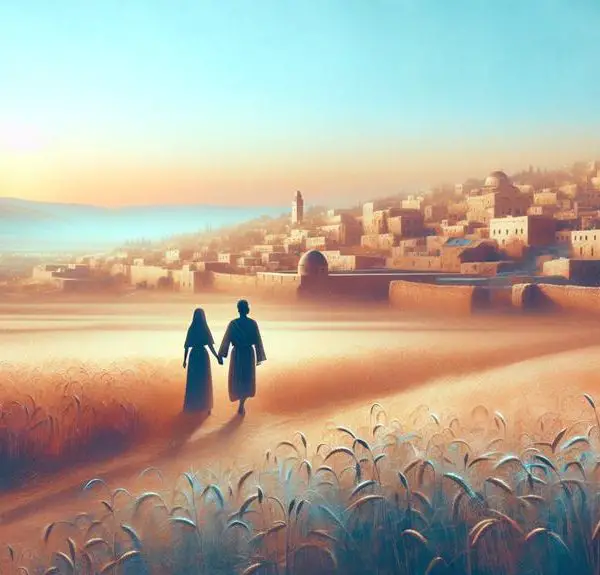

Sign up